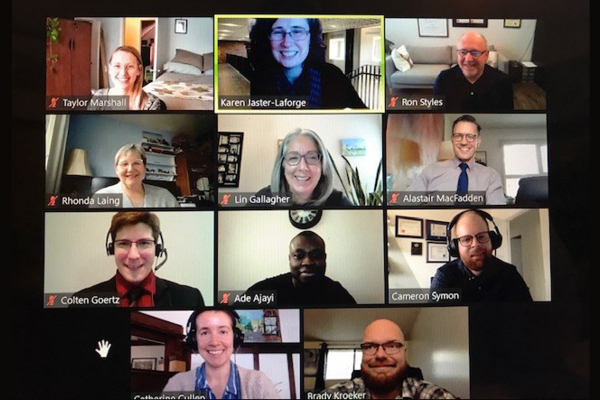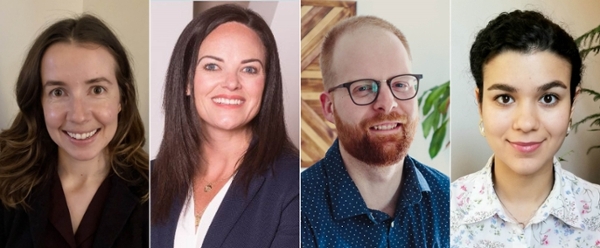
JSGS students compete virtually in annual internal case competition
Held on Friday, November 6, the JSGS Internal Case Competition brought on a new virtual format that saw students from around the world working together to highlight their knowledge and expertise while competing for the first place title.
By Taylor Marshall, JSGS Student Experience OfficerHeld on Friday, November 6, the JSGS Internal Case Competition brought on a new virtual format that saw students from around the world working together to highlight their knowledge and expertise while competing for the first place title.
This year's case saw students providing recommendations on "The South Saskatchewan River Project".
Students assumed the role of an interdepartmental team, tasked with presenting cabinet with an analysis of the key considerations of the proposed project—including the environmental and economic implications, the options for the funding of the project, and the pace of its development.
This was no small task for the six teams, but they all did an excellent job in coming together to provide the panel of judges with thoughtful and well-informed recommendations.
“The internal competition was a thrilling experience and a great opportunity to work with and learn from fellow JSGS colleagues,” said Catherine Cullen, JSGS online MPA student. “The case study topic was something I didn't expect and forced us to think on our feet. I feel lucky to have been a part of it and am really excited for the national competition."
Cullen was one of four members of the winning team. Joining her from the University of Saskatchewan (USask) campus was Brady Kroeker, and from the University of Regina (U of R) campus was Ade Ajayi and Cameron Symon.
One of this year’s judges, Colten Goertz, is a Senior Policy Analyst with the Housing Network, Ministry of Social Services and a JSGS alumnus. As a former case competition competitor and first-time judge, Goertz commended the school on its organization of this year’s virtual event.
“The event was spectacular. The staff did an amazing job in organizing the event and made it look seamless,” said Goertz. “Students participating excelled in demonstrating their skills and research capabilities under intense pressure.”
Goertz also empathized with the amount of pressure students faced as they went into the case competition.
“As a former competitor, I felt the greatest of empathy for the students as they dealt with all the stress and strain involved with coming up with an answer to a wicked policy question before a less than forgiving panel of judges.”
Colten was one of those less than forgiving judges this year, taking on the fictional role of a no-nonsense Deputy Minister of Finance. Colten commented that he thought a lot about the duties of the role, the context of what was going on in Saskatchewan, the political implications of decisions, the competing interests from other public interests, and the duty to the public in solid fiscal management when preparing his persona.
“I’ve been at treasury board...I’ve sat and listened as ministers, elected officials, and stakeholders grill the public service about its proposed ideas,” said Goertz. “So...I simply mirrored what I saw from the perspective of the public servant. If I was intense, it is because public service is intense. You have to be prepared and you have to be strong because if you can answer the hard questions and make your case, you can influence change and you can see your ideas become the way things are.”
Joining Goertz on the panel was JSGS Executive-in-Residence Alastair MacFadden, and returning panel judge, Rhonda Laing, Director of Policy, Planning and External Relations at Western Economic Diversification Canada.
“The JSGS Case Competition was great—it always is. The diversity in student experiences is so impressive to see in the presentations and responses to questions from the judges,” said Laing. “This year’s case study regarding the potential for irrigation expansion in SK, hit very close to home, as our team at WD created the Prairie Prosperity report upon which the case was based. Listening to the students’ interpretation of the report and the context provided was very insightful given they had only two hours for research and preparation of the presentation and very likely with little background in the topic.”
In addition to commending students for their thoughtful and engaging presentations, Laing also remarked on the event as a whole.
“Well done to the folks at JSGS for a flawless technical event, the movement of students, coaches and judges through the virtual rooms was very well done.”

Cullen and Symon were also selected as two of four members who will represent the school this winter at the national case competition, organized and supported by the Canadian Association of Programs in Public Administration (CAPPA). Joining them are Melissa From from the USask campus and Parvin Yazdanparast from the U of R campus. They will be mentored by coaches and Executives-in-Residence Ron Styles and Lin Gallagher.
The national case competition will be held virtually this year in February 2021.
On behalf of the entire school, we wish the national team the best of luck as they compete against policy schools from across the country.

